Part 6: The Ironface Emir
Chapter 6 – The Ironface Emir – 1144 to 1155Not long after Emir Masud’s return to Cádiz, disaster struck once more as a smallpox epidemic swept through the region, carried across the straits of Gibraltar and into Iberia by ten thousand Moroccan soldiers.
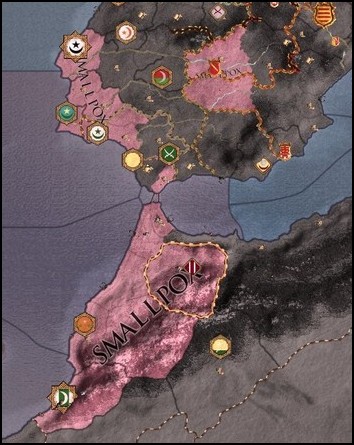
To the irritation of his lords and retainers, the red plague quickly ground Masud's army to a halt, ending any further campaigns for the foreseeable future. And matters only worsened from there, as the Emir himself began showing the ugly pustules and sickening cysts synonymous with the dreaded pox.
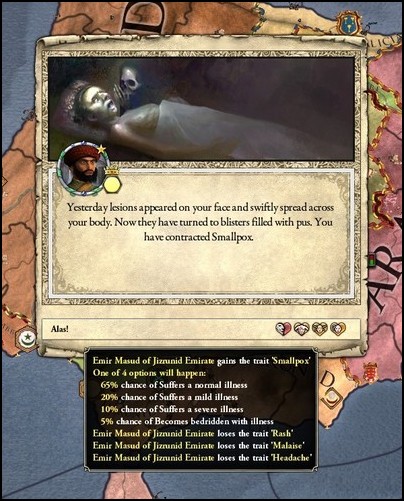
His physicians were quickly summoned, but by then it was already too late, and Masud’s condition was quickly spiralling towards death. The experienced physicians concluded that the only way to save the Emir was to slice away any part of his body that was tainted, and once Masud agreed, an hours-long operation commenced.
The end result was… not pleasant, to say the least. Large chunks of flesh had been carved from his body, his face and physique became unrecognisable, every gust of wind send spasms of pain convulsing through his body - but in fairness to the physicians, the operation was technically a success, with the pox cut away from Masud one slice at a time.
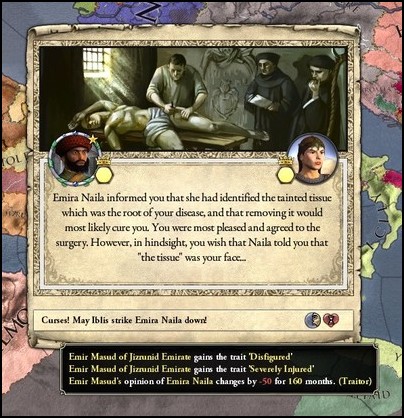
All the same, these extensive deformities and his pegleg left Emir Masud looking like a bag of flesh and hair, with a few bones thrown in for good measure. Masud retreated from the public eye, refusing to show his face to either his vassals or the peasantry, and even began wearing an iron mask, which went nicely with his iron leg, to cover the more sickening parts of his face.
Spending more time away from the battlefield, and dedicating more time to his wives and harem, meant that the Emir had a crop of toddlers running around the palace before long.
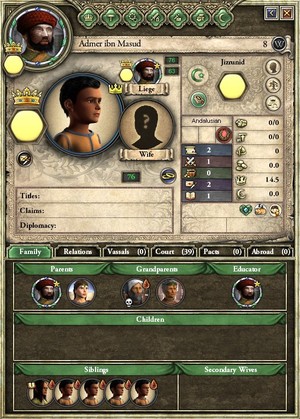
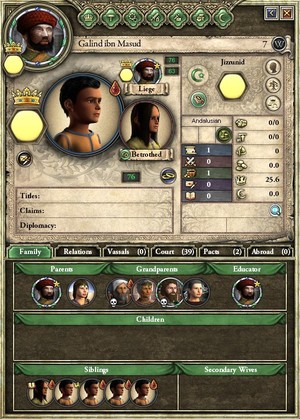
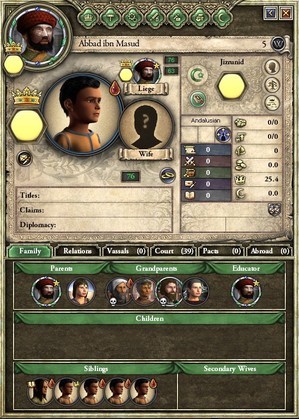
The Emir also took a personal interest in raising his sons, especially his firstborn, determined to groom a worthy successor. From his earliest years, the youngster was forced to attend regular council sessions, travel to meet the walis of nearby cities, afforded a place in domestic and foreign negotiations, and even rode beside his father into battle - Admer was raised to rule.
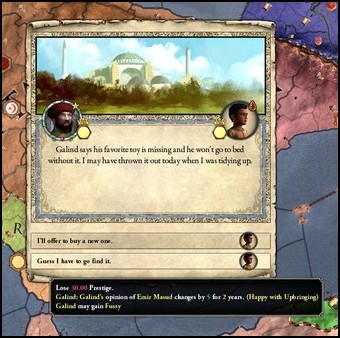
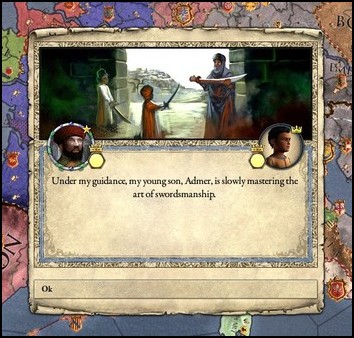
Whilst recovering from his injuries, Masud also took to reading and writing poetry, a luxury he’d never had the pleasure of experiencing before. To that end, the Emir even began learning how to speak the languages of Christendom, eager to see what other cultures had to offer in the way of written art. Under his rule, dozens of books were translated and studied in the libraries of Cádiz, books that would later become the foundation of a much greater house of learning.
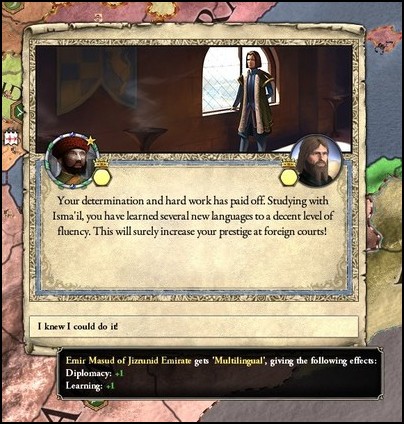
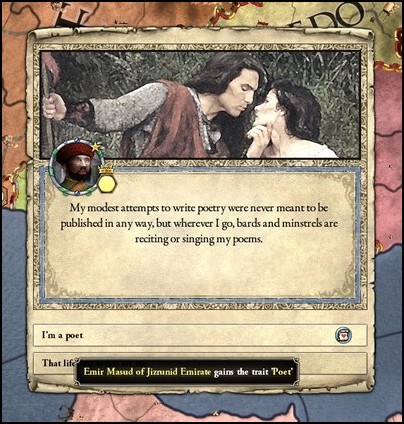
Spending time with his children and indulging in his interests did a world of good to Masud, and before long, he felt strong enough to look outwards once more.
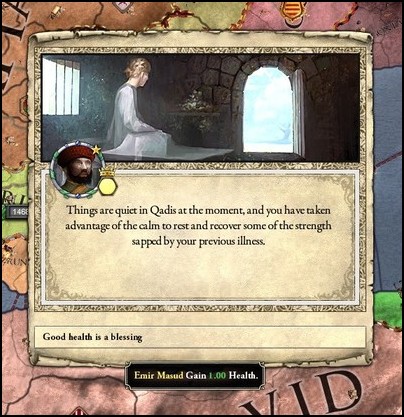
First on his agenda was the recently-conquered territory of Granada. Masud had already decided to rule the vast majority of it as his personal demesne, but the issue wasn’t so much an administrative one as a religious one. It seemed as though, within the decade that they had owned it, the Jimena Kings of Aragon had managed to expel or kill most of the Sunnis living in Granada, so that the region became heavily populated by Christians.
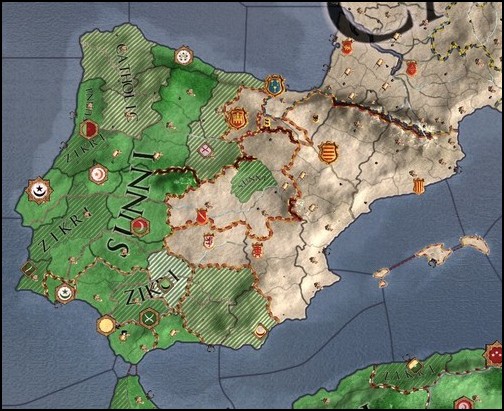
The clergy urged Emir Masud to fight with the same blade, and suppress the practice of Christianity within his territory. Masud, however, wasn’t interested in violence as an answer to his problems. Instead, he opted to allow both Christians and Jews to live peacefully under his rule, though a strict Jizya tax was instituted on them.
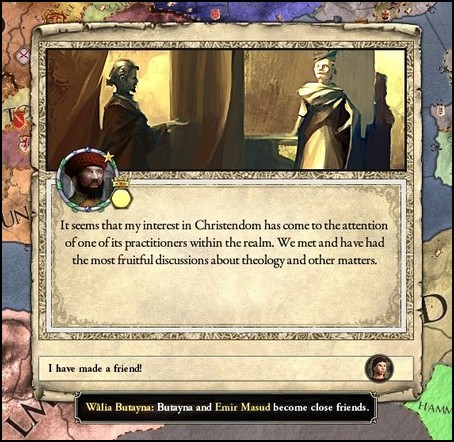
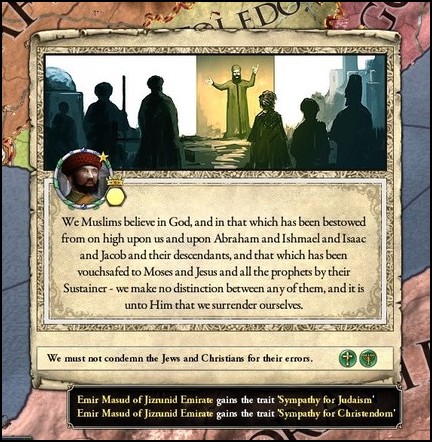
The next issue that had to be dealt with was that of security. Sultan Lubb had died whilst leading a campaign into the Cantabrian Mountains, with his vast domains passing to his grandson, Rasiq. The newly-crowned sultan didn't wait long before picking up his grandfather's sword, avenging his predecessor's death and conquering the last independent remnants of Galicia.
With his borders secure, many within Cádiz feared that the Sultan’s attention would turn to Granada next, so Emir Masud decided to court another African power. And before much longer, his efforts bore ripe fruit, with an alliance signed between Masud and the Athbejid Emir of Tunis, a powerful lord in his own right.
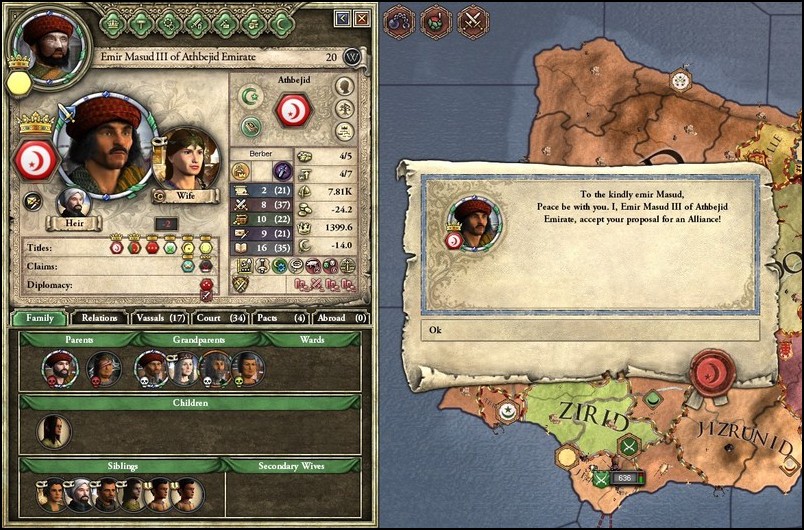
With the swords of north Africa behind him, Masud felt confident enough to begin tackling internal problems, with the Emir launching a campaign to stamp out corruption in the capital - the same corruption that had killed his father and that threatened him. Not only did Masud order the imprisonment of countless plotters, but he also dealt harshly with those who thought to escape the law, including the powerful Sheikh Utman, who had been extorting the Christians of Granada and forcing them pay far more than the required Jizya.
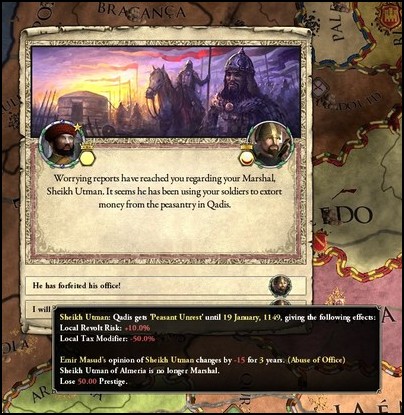
Once matters within Cádiz began to settle down, Emir Masud began looking outwards, eager to see his domain prosper. He ordered and personally financed the construction of roads binding his divided counties into one, along with outposts and guards to man them.
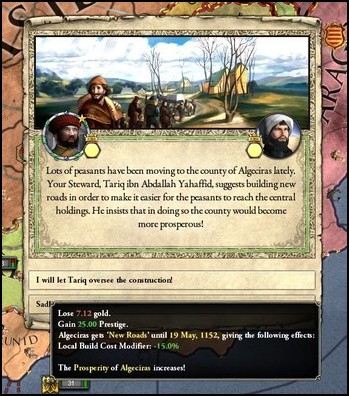
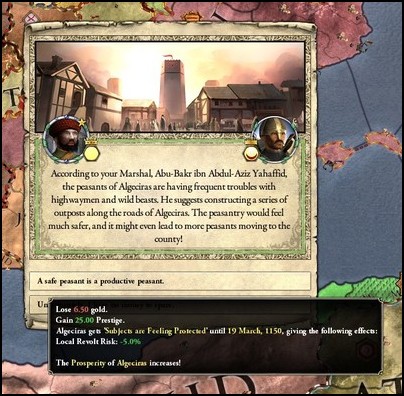
To actually forge his territories under a new Emirate, however, Masud would have to reconquer Malaga. Not only was the city rich and populous, but it stood at the crossroads of half-a-dozen trade routes, dividing the Jizrunid domains into two. And as long as his domains were divided, Masud would never be able to rule them effectively.
The opportunity to right this wrong arrived late in 1150, when Sultan Rasiq met his death in another’s blade, leaving the throne to his infant son.
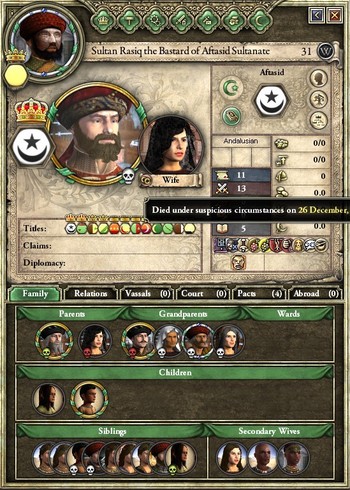
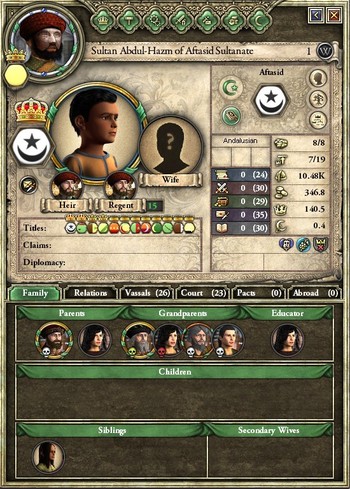
This presented the perfect chance to strike whilst a babe wore the crown, and retake Malaga. So, without so much as a consultation with his council, Emir Masud promptly declared war on the Aftasid Sultanate.
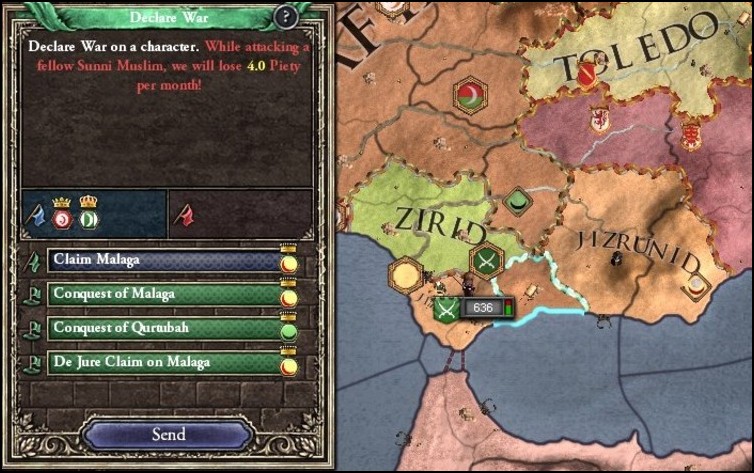
Masud also sent envoys calling his allies into the war. The Almoravid Sultan accepted almost immediately, raising his own troops and marching them north, quickly followed by the Emir of Tunis.
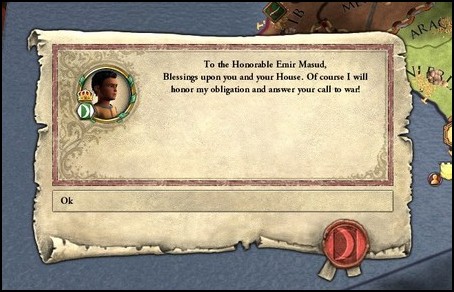
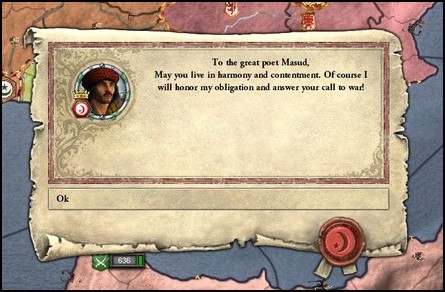
The Aftasids leapt into action, throwing together an army and invading Cádiz far quicker than Emir Masud had expected. Just a month after the declaration of war, the sturdy fortress of Granada succumbed to an Aftasid army, buckling under siege weaponry and intense assaults.
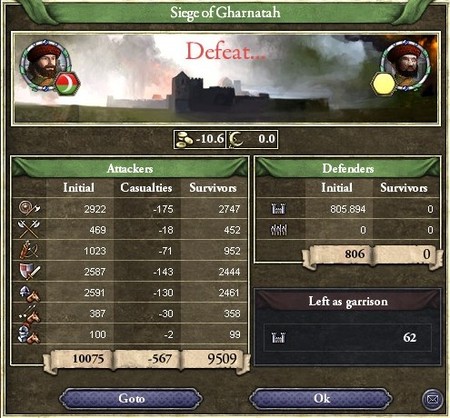
Masud, despite protests from his vassals, did nothing to relieve the siege. He wouldn’t be rushed into battle only for his army to be destroyed; instead, Masud led his army to besiege Malaga, with the Almoravid army following closely behind - a combined force of 12,000 soldiers.
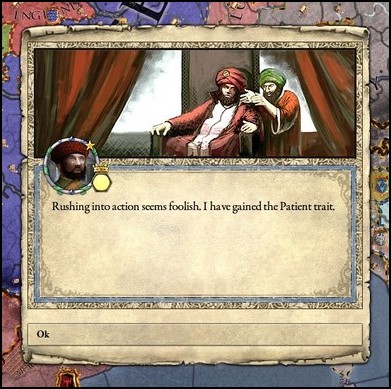
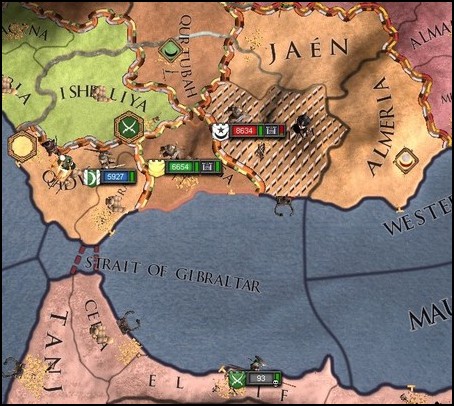
After a short assault, the inexperienced garrison of Malaga surrendered, and Masud opted to take the castle without sacking it. The Aftasid commanders decided against attacking the combined Jizrunid-Almoravid force, instead marching further north and seizing the lightly-defended castles dotting the northern border.
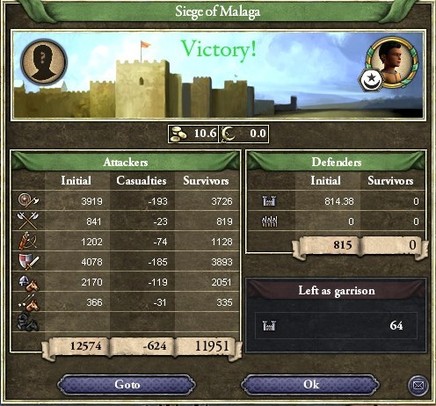
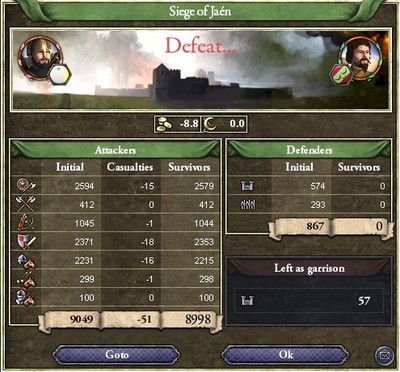
By now, after a long march from the east, the Tunisian army had arrived at the front. And with another 7000 soldiers bolstering his own army, Emir Masud adopted a more aggressive strategy, marching into the occupied territory and taking back Granada. The Tunisians pushed further north and liberated the forts dotting Jaén.
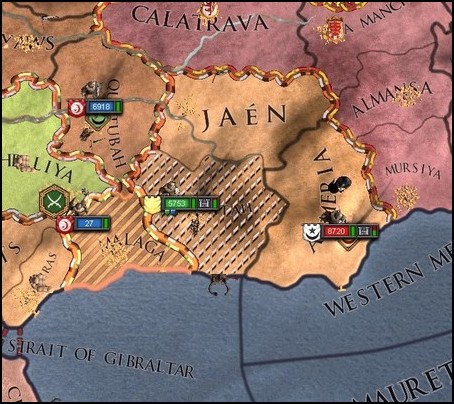
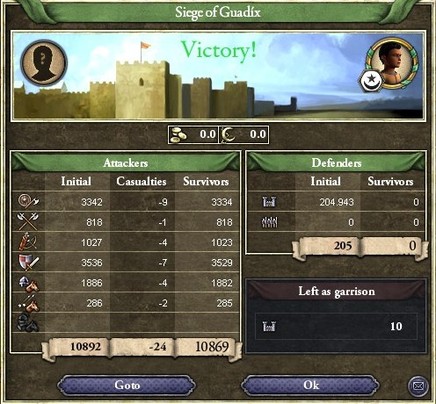
After a few weeks of careful manoeuvring, Masud managed to corner the Aftasid army, forcing them into Almeria, with nowhere to flee. It was only now, with numerical superiority and tactical advantage on his side, that Emir Masud decided to meet the enemy on the field.
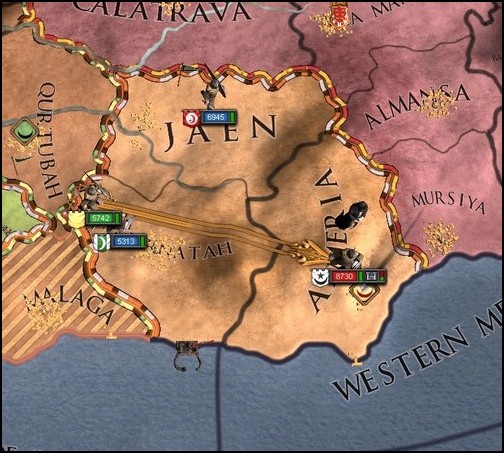
The early hours of the battle were thick and bloody, and the Aftasids proved themselves an experienced army. Once the Tunisians and Almoravids joined the fight, however, the numbers prevailed. the enemy formation was broken, and the battle was won.
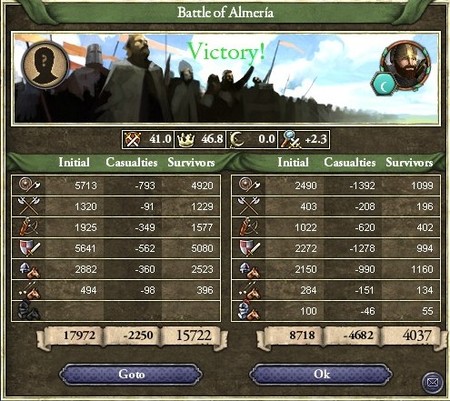
After being crushed on the battlefield twice, the sheikhs and emirs of the Aftasid Sultanate were forced into abandoning Malaga, agreeing to all Jizrunid demands in return for an end to hostilities.
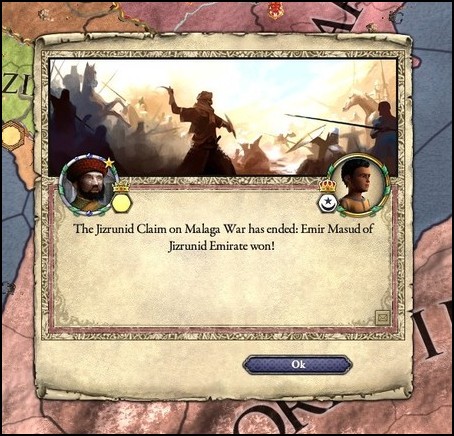
And with that, Emir Masud has managed to do what his father never could, and carve out a small but powerful Jizrunid emirate in southern Iberia. Masud sent messengers ahead of his army with news of his victory, and orders to prepare grand celebrations throughout Cádiz, as befitting that of a conqueror.
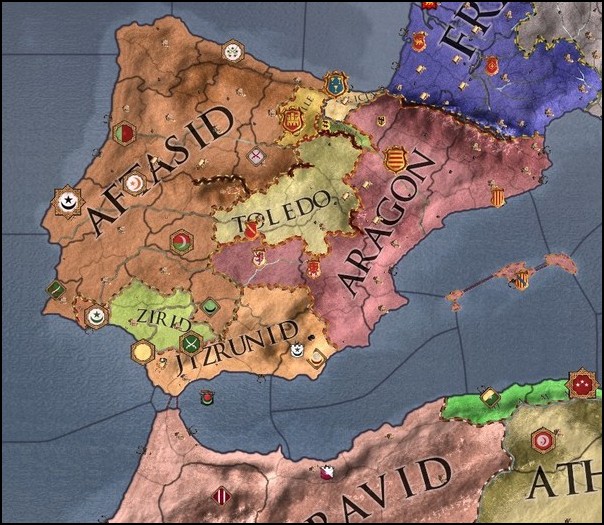
What Masud found at Cádiz, however, was not what he’d expected. Whilst he was battling with the Aftasids, harem intrigues seemed to have overtaken the entire court, with wives and concubines and servants and slaves all conspiring and plotting against one another. The crisis ended just as Masud crushed the enemy on the battlefield, climaxing in a gruesome nighttime raid, the death of several maids and, more importantly, one of his sons.
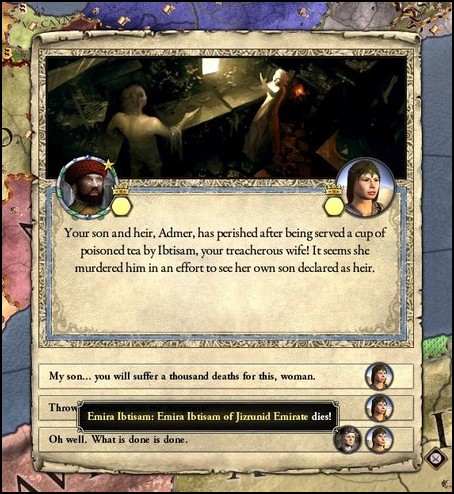
His firstborn, his favourite, his heir.